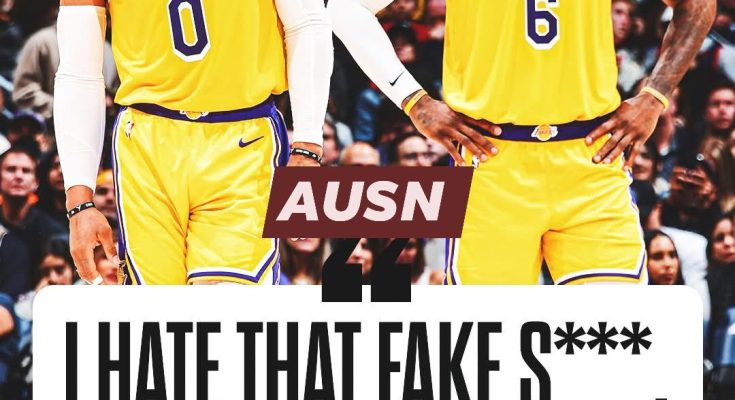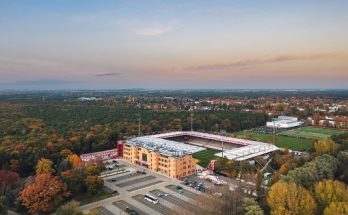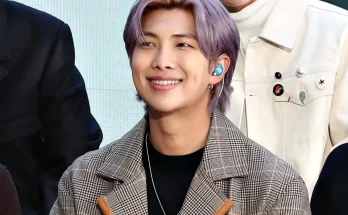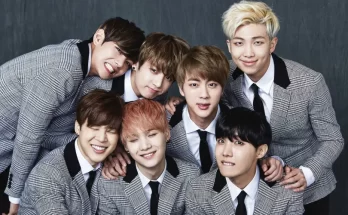According to a report from The Ringer, tension within the Los Angeles Lakers locker room during Russell Westbrook’s tenure may have been more personal than many fans realized. The article suggests that Westbrook grew increasingly frustrated with LeBron James, not merely over basketball matters but because of what he perceived as LeBron’s “fake” demeanor. What began as a high-profile collaboration between two future Hall of Famers turned into a strained partnership, filled with subtle clashes in personality, leadership, and authenticity. For Westbrook, the incident that seemed to encapsulate it all occurred during a Lakers team event that featured actor Will Smith as a guest speaker.
The story goes that Smith had been scheduled to speak at a Lakers team gathering, a motivational moment meant to unite the roster and share lessons about perseverance and self-awareness. It was supposed to be an inspiring off-court bonding session, one that brought players closer as they pursued a championship. However, what unfolded reportedly rubbed Westbrook the wrong way. Before Smith began to speak, both LeBron James and Anthony Davis briefly left the event. When they returned, LeBron immediately took control of the room, dominating the conversation, asking pointed questions, and even reciting famous lines from Will Smith’s films. To onlookers, it might have appeared as playful charisma or LeBron’s typical leadership presence. But to Westbrook, it felt forced — a performance rather than a genuine interaction.
Westbrook, known throughout his career for his fiery authenticity and emotional honesty, reportedly saw the exchange as emblematic of a broader issue. He believed LeBron’s friendliness and public image did not match the private reality of their interactions. While LeBron carefully curated his persona as a positive, team-first leader, Westbrook felt that the superstar’s behavior behind closed doors often reflected calculated self-interest. Sources suggested that Westbrook viewed LeBron’s constant performative engagement — his tendency to take charge of moments, especially in front of guests or media — as an act meant to reinforce his leadership image rather than to sincerely connect with teammates.
This growing sense of inauthenticity deeply bothered Westbrook. The two were already struggling to find chemistry on the court, with the Lakers’ offensive rhythm faltering and both players trying to adjust to diminished roles. Westbrook’s once-constant energy seemed dimmed, his frustration visible as the team stumbled through inconsistent stretches. According to the report, these frustrations extended beyond basketball. Westbrook reportedly began distancing himself, attending fewer team functions, and maintaining minimal personal interaction with LeBron outside of required basketball settings. The bond that many expected between two former MVPs never materialized.
The irony is that when the Lakers traded for Westbrook in 2021, it was LeBron himself who had advocated for the move. The two had met at LeBron’s house, discussing their vision for how the partnership could work. LeBron, always keen on surrounding himself with experienced stars, believed Westbrook’s intensity and playmaking could relieve some of the creative burden on him and Davis. For his part, Westbrook had viewed the opportunity as a dream come true — a chance to play for his hometown team and chase a championship alongside one of the greatest players of all time. But once the season began, reality set in quickly. The Lakers struggled to build chemistry, plagued by injuries, poor spacing, and a lack of consistent effort. Westbrook’s ball-dominant style clashed with LeBron’s preference for orchestrating the offense.
The Will Smith incident merely underscored what had been festering beneath the surface — two different approaches to leadership and authenticity. LeBron’s style, polished and media-savvy, was centered on control and presentation. He understood how every gesture could shape narratives. Westbrook’s style was raw, emotional, and often confrontational. He valued directness over diplomacy, honesty over appearance. To him, being real meant speaking your mind and letting emotions show, even if it caused friction. So when LeBron’s interactions felt rehearsed or politically calculated, Westbrook saw that as a betrayal of team trust. It wasn’t that he disliked LeBron personally, but that he could no longer believe in what he represented.
This dissonance reportedly made daily life within the Lakers organization tense. Coaches and teammates noticed a growing disconnect between the stars. Westbrook would often appear isolated during huddles or team dinners. The locker room dynamic, once built on excitement and shared purpose, began to fracture. Even Anthony Davis, who tried to maintain harmony, struggled to bridge the gap. The coaching staff under Frank Vogel attempted to keep everyone aligned, but the chemistry never clicked. Meanwhile, the media pressure mounted, with every poor performance magnified and every sideline expression turned into a headline.
When LeBron and Davis missed extended time due to injuries, the team’s struggles deepened. Westbrook was left to carry a lineup that lacked shooting and structure, further fueling his frustration. He took the brunt of public criticism, with fans and analysts blaming him for the team’s failures. Behind closed doors, Westbrook reportedly felt abandoned — believing that the same teammates and organization that had promised support were now distancing themselves. His relationship with LeBron deteriorated to little more than formal professionalism. Even in press conferences, their praise of each other seemed obligatory, devoid of genuine warmth.
For Westbrook, this experience left a lasting impression. He had long been known for his loyalty and passion, traits that endeared him to fans in Oklahoma City and later in Houston and Washington. Yet in Los Angeles, he felt misunderstood and underappreciated. The notion that his authenticity was being judged against what he saw as LeBron’s “manufactured leadership” made the situation intolerable. By the time trade rumors began to swirl, Westbrook reportedly welcomed the idea of moving on. The excitement of returning home to Los Angeles had turned into disillusionment.
The eventual trade that sent him to the Clippers offered a chance for redemption. In a smaller role, Westbrook thrived again, surrounded by teammates who respected his straightforwardness. He appeared more relaxed, more himself — a reflection of the environment he preferred, one where raw emotion was not frowned upon but valued. Many close to him said the difference in his demeanor was striking. For the first time in years, he seemed free from the political tension that had consumed his time with the Lakers.
Meanwhile, LeBron continued to maintain his image as the franchise’s cornerstone and spokesperson. His relationships with teammates remained professional, and he carried on shaping his narrative as a leader and family man. From an outside perspective, it was business as usual. But for those who followed the behind-the-scenes dynamics, the fallout with Westbrook revealed something deeper about the challenges of building modern NBA superteams. Talent alone cannot guarantee harmony. When personalities as strong as LeBron’s and Westbrook’s collide, authenticity and perception become just as important as skill sets.
The incident with Will Smith, while seemingly trivial on the surface, symbolized the philosophical divide between the two stars. LeBron’s eagerness to control the spotlight, to appear engaged and charming in front of a high-profile guest, may have been second nature to him — an instinct honed over decades of media attention. Yet to Westbrook, who prizes unfiltered emotion, it came off as performative, even insincere. He didn’t want to be part of a performance; he wanted to be part of a brotherhood. That distinction mattered more to him than most people realized.
Westbrook’s frustration also spoke to a broader sentiment shared by some former teammates who’ve worked alongside LeBron. While few doubt LeBron’s basketball genius or work ethic, some have quietly acknowledged that life in his orbit can be overwhelming. His presence dominates everything — the game plan, the media narrative, the team culture. For players like Westbrook, who also see themselves as alpha personalities, this dynamic can be suffocating. Westbrook’s defiance and self-belief, which once made him one of the league’s fiercest competitors, didn’t mesh with LeBron’s brand of controlled leadership.
In retrospect, the Lakers’ decision to pursue Westbrook was doomed more by personality than by basketball fit. The front office had envisioned a trio of superstars who could share the load and intimidate opponents with talent alone. But chemistry, trust, and emotional alignment were never given the same priority. The Will Smith story only adds another layer to the understanding of why things unraveled so quickly. It wasn’t just about missed shots or turnovers — it was about respect, perception, and authenticity.
For Westbrook, the experience may have hardened his belief that being genuine matters more than anything else. He has often spoken about staying true to himself, regardless of how others perceive him. The fallout in Los Angeles, and his perception of LeBron’s “fake” demeanor, only reinforced that conviction. As one source put it, Westbrook “doesn’t do fake.” He thrives in environments where emotion is honest, where interactions are real. The Lakers, led by a superstar whose every move is calculated for legacy and brand, were the opposite of that.
LeBron, on the other hand, likely saw things differently. To him, professionalism, public perception, and image are part of leadership. Maintaining composure, engaging with guests, and controlling narratives are tools of influence — essential parts of being a modern superstar. His version of authenticity lies in consistency and responsibility, not raw emotion. What Westbrook saw as insincerity, LeBron may have viewed as maturity. The difference is subtle but fundamental, and it ultimately made them incompatible as teammates.
In the end, the partnership that was supposed to elevate the Lakers instead became one of the most disappointing experiments in recent NBA history. The fallout, colored by personal clashes and differing worldviews, serves as a reminder that even the most gifted athletes can fail to connect when authenticity becomes a point of contention. For Westbrook, the memory of that Will Smith event likely remains a symbol of what went wrong — not because of what was said in the room, but because of what it revealed about the people in it.



